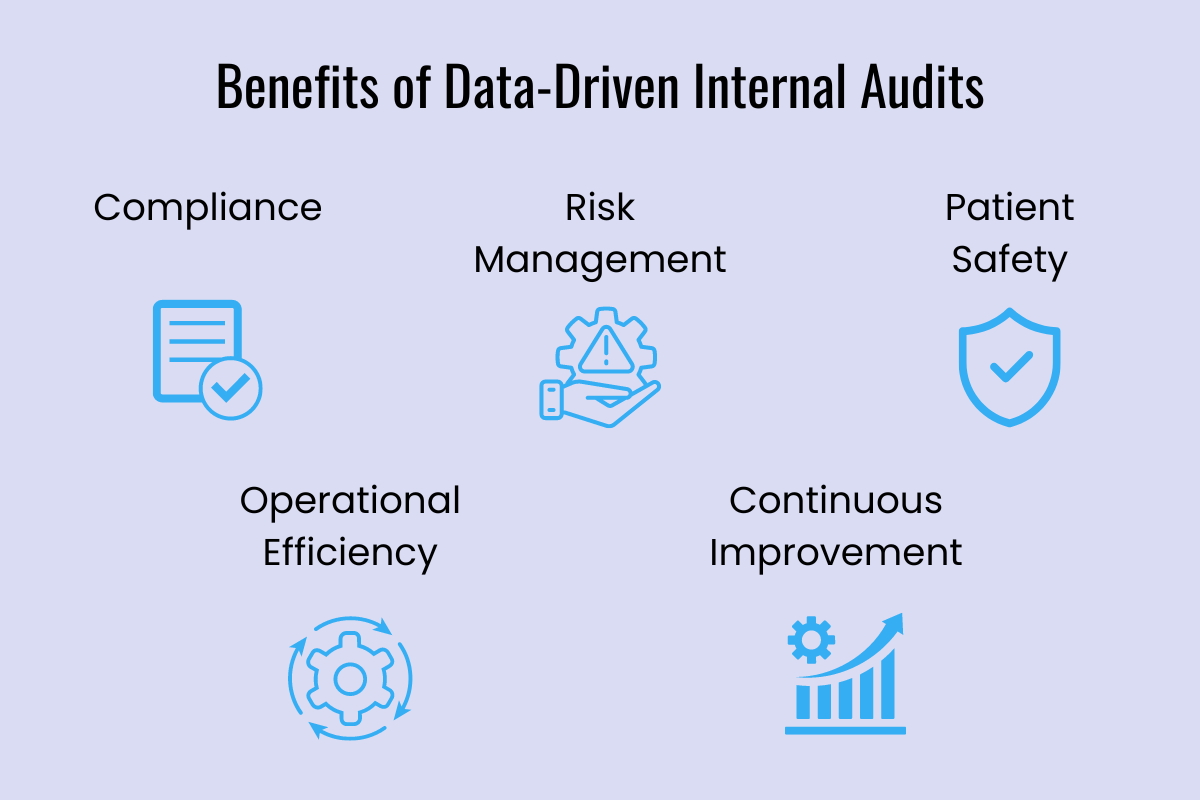3 min read
The Importance of Data-Driven Internal Audits in Healthcare
Performance Health Partners
March 15, 2023

Data-driven internal audits are crucial for the success of healthcare organizations. From ensuring regulatory compliance and maintaining patient safety to optimizing operations, read on to learn why data-driven internal audits are essential in healthcare.
Compliance
Compliance with regulatory standards such as HIPAA is a crucial obligation for healthcare providers. These standards demand that patient health information is kept confidential and secure. Data-driven internal audits are an effective tool to assist healthcare providers in fulfilling regulatory requirements and avoiding potential fines or penalties. Additionally, these audits help healthcare organizations to detect any areas of non-compliance, such as data breaches or unauthorized access to patient information.
Check Point Research data shows that global cyber attacks surged by 38% from 2021 to 2022, with healthcare ranking among the top three most targeted industries.
This is particularly alarming since cyber attacks on healthcare facilities can cause a myriad of negative consequences, such as service disruption, financial losses, legal and regulatory complications, and reputational harm.
Moreover, being able to prevent these attacks using data provided by internal audits in healthcare is not only important for the safety of patients, but also their quality of care. According to a survey conducted by the Ponemon Institute, 20% of healthcare organizations reported higher patient mortality rates following a cyber attack.
Audits provide clearer pictures which allow for better visualization of the data. Since data-driven audits empower auditors to analyze large amounts of data and test the entire population, it helps to generate more accurate numbers.
Healthcare Risk Management
The healthcare industry is inherently risky, and internal audits play a vital role in helping healthcare providers identify and manage potential risks. By analyzing data, internal auditors can detect patterns around potential safety issues, such as medication errors, patient falls, or healthcare-acquired conditions, and provide recommendations for improvement in risk management in healthcare.
Given the extensive amount of data generated in healthcare, manual review is often infeasible. Therefore, data-driven sources enable more accurate reporting, ultimately reducing risks. Moreover, data can help identify and understand the risks of outliers that might be disregarded by humans due to lack of patterns or time constraints. This approach can enable better visualization of risks in a timely manner, allowing for improved task prioritization as the effects of different risks shift.
Operational Efficiency
In a survey done by AMN Healthcare in 2022, 85% of healthcare organizations reported that they had a shortage of healthcare professionals. As a result, managerial staff is busier than ever, making it crucial to have systems in place that are quick and efficient.
Due to sizable inflation throughout 2022, hospitals began 2023 with a 2% year-over-year increase in total expenses leading healthcare management to look for effective ways to reduce their costs.
Data-driven internal audits in healthcare can alleviate these challenges, as they help providers optimize operations. By analyzing data, auditors can identify areas where resources can be allocated more effectively, and costs can be reduced.
Healthcare audits can help identify areas where organizational processes can be improved, such as reducing wait times for appointments or streamlining the supply ordering process. This is especially important today as the healthcare industry faces growing supply chain issues and staffing shortages.

Increasing Quality and Patient Safety
Ensuring patient safety is a top priority in healthcare, not only for better outcomes but also to reduce costs.
The Institute of Medicine has estimated that medical errors cost between $17 billion to $29 billion annually in the United States alone. Healthcare audits driven by data can help catch these errors and enable the implementation of measures to prevent their recurrence, thereby reducing costs.
Data-driven internal audits can improve patient care by helping healthcare providers identify areas that need improvement, in addition to enhancing patient safety. For example, analyzing data on readmission rates can reveal where patients may require additional support or education after discharge, leading to better health outcomes. It can also improve patient satisfaction rates, which results in:
- Improved patient loyalty
- Better clinical outcomes
- Enhanced patient compliance
- Fewer medical malpractice suits
- Continuous Improvement
Internal audits play a crucial role in a healthcare provider's quality improvement program. Through data analysis and identification of areas that require improvement, auditors help providers continuously enhance their operations, ultimately leading to improved outcomes for patients. Furthermore, data-driven internal audits provide greater transparency, increasing trust in the audit process among stakeholders.
By identifying patterns of suspicious activity, such as billing irregularities or improper prescribing practices, auditors can pinpoint problematic areas in all sectors of the healthcare industry. An easy-to-use and accurate auditing system enables healthcare organizations to identify and address issues more efficiently, leading to ongoing improvements and the provision of the highest quality care for their patients.
Ready to learn more about audits in healthcare?
Leveraging data through data-driven internal audits is essential for the healthcare industry. It enables healthcare providers to make informed decisions that benefit both patients and the organization.
With Performance Health Partner's cutting-edge audit and compliance software, healthcare organizations can optimize the audit process, reducing harm and improving patient outcomes.
Request a free demo now to experience the power of data-driven internal audits firsthand.


